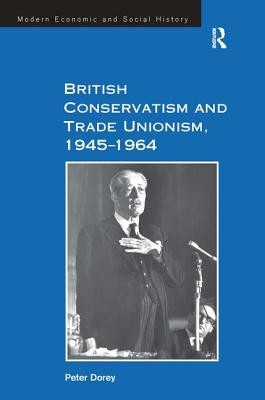
- We will send in 10–14 business days.
- Author: Peter Dorey
- Publisher: Routledge
- ISBN-10: 075466659X
- ISBN-13: 9780754666592
- Format: 15.6 x 23.4 x 1.4 cm, kieti viršeliai
- Language: English
- SAVE -10% with code: EXTRA
Reviews
Description
For most of the twentieth century, the Conservative Party engaged in an ongoing struggle to curb the power of the trade unions, culminating in the radical legislation of the Thatcher governments. Yet, as this book shows, for a brief period between the end of the Second World War and the election of Harold Wilson's Labour government in 1964, the Conservative Party adopted a remarkably constructive and conciliatory approach to the trade unions, dubbed 'voluntarism'. During this time the party leadership made strenuous efforts to avoid, as far as was politically possible, confrontation with, or legislation against, the trade unions, even when this incurred the wrath of some Conservative backbenchers and the Party's mass membership. In explaining why the Conservative leadership sought to avoid conflict with the trade unions, this study considers the economic circumstances of the period in question, the political environment, electoral considerations, the perspective adopted by the Conservative leadership in comprehending industrial relations and explaining conflict in the workplace, and the personalities of both the Conservative leadership and the key figures in the trade unions. Making extensive use of primary and archival sources it explains why the 1945-64 period was unique in the Conservative Party's approach to Britain's trade unions. By 1964, though, even hitherto Conservative defenders of voluntarism were acknowledging that some form of official inquiry into the conduct and operation of trade British unionism, as a prelude to legislation, was necessary, thereby signifying that the heyday of 'voluntarism' and cordial relations between senior Conservatives and the trade unions was coming to an end.
EXTRA 10 % discount with code: EXTRA
The promotion ends in 23d.04:41:54
The discount code is valid when purchasing from 10 €. Discounts do not stack.
- Author: Peter Dorey
- Publisher: Routledge
- ISBN-10: 075466659X
- ISBN-13: 9780754666592
- Format: 15.6 x 23.4 x 1.4 cm, kieti viršeliai
- Language: English English
For most of the twentieth century, the Conservative Party engaged in an ongoing struggle to curb the power of the trade unions, culminating in the radical legislation of the Thatcher governments. Yet, as this book shows, for a brief period between the end of the Second World War and the election of Harold Wilson's Labour government in 1964, the Conservative Party adopted a remarkably constructive and conciliatory approach to the trade unions, dubbed 'voluntarism'. During this time the party leadership made strenuous efforts to avoid, as far as was politically possible, confrontation with, or legislation against, the trade unions, even when this incurred the wrath of some Conservative backbenchers and the Party's mass membership. In explaining why the Conservative leadership sought to avoid conflict with the trade unions, this study considers the economic circumstances of the period in question, the political environment, electoral considerations, the perspective adopted by the Conservative leadership in comprehending industrial relations and explaining conflict in the workplace, and the personalities of both the Conservative leadership and the key figures in the trade unions. Making extensive use of primary and archival sources it explains why the 1945-64 period was unique in the Conservative Party's approach to Britain's trade unions. By 1964, though, even hitherto Conservative defenders of voluntarism were acknowledging that some form of official inquiry into the conduct and operation of trade British unionism, as a prelude to legislation, was necessary, thereby signifying that the heyday of 'voluntarism' and cordial relations between senior Conservatives and the trade unions was coming to an end.


Reviews